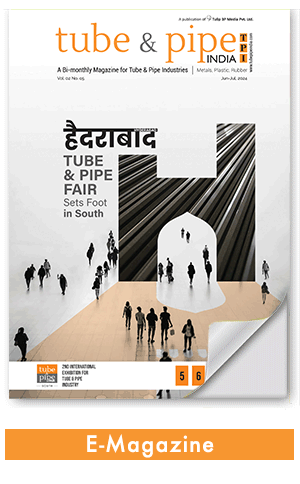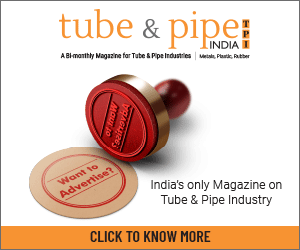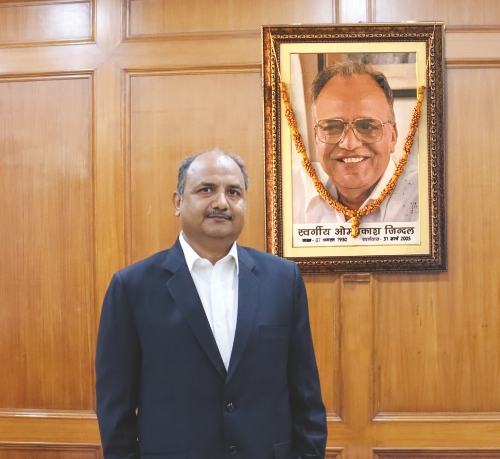
Jindal Industries Private Limited (JIPL Hissar) is a pioneer in HR MS steel tube manufacturing in India. Even as the group celebrates its hard-earned legacy, the need for constant growth and development is priority. It is probably the reason why the group remains relatable.
An industry expert with nearly 30 years of experience in Precision and Seamless Tube Industry Mr. Sunil Jain, Director and CEO of JIPL (Hissar), was kind enough to sit in a conversation with Tube & Pipe India and share with us the various plans of the group. While participating in government projects, setting up new warehouses, MoU with other company and product line expansion are among the various future plans of the group. The Greenfield Pipe & Tube plant in Ballari simply takes the spotlight. The project will not only provide a geographically strategic location to the group, but it will also expand its capacities by an additional 500,000 TPA in 2 phases. The HR steel Manufacturer JSW will be in close vicinity of the Tube plant.
Tube & Pipe India: Please tell us about your company’s history and major achievements.
Sunil Jain: I am extremely proud to be part of O. P. Jindal group.
The journey has been incredible in terms of contribution towards nation building since inception and we continue to do so today and will continue to do in future as well. Looking back Jindal Industries Private Limited Hissar (JIPL) was set up more than 50 years ago by a group of friends/relatives, one of them being Mr. O.P. Jindal. Initially, a bucket-manufacturing unit, the Hissar plant has since then reimagined itself twice, first into 2,000 TPM steel and strips manufacturing plant, and then into a steel tube manufacturing plant housing two mills. Today, the plant taps into a production capacity of 35,000 TPM with the help of 11 mills spread across an area of 32 acres, which is a rarity in the Indian tube and pipe industry.
JIPL is a pioneer in ERW steel tubing solutions. Our adherence to quality is our biggest strength. We recently got certified with BIS certifications IS9295 & for higher steel grades with YST310, YST355, etc. We started production of coated tubes for gas lines within the complex this year at Hissar.
TPI: Can you elaborate on your plant setup, capacity, and market distribution?
SJ: As I mentioned, at our Hissar plant, we house 11 mills and three slitters, which are equipped and upgraded with the best technology to work at high-speed production. The Hissar plant’s installed capacity is 450,000 TPA out of which our active production ranges from 380,000-400,000 TPA.
Currently, we are manufacturing pipes with a rolling range of up to 16 inches outside diameter. Our plant has been manufacturing API tubes, used for oil and petroleum applications, for 10-12 years.
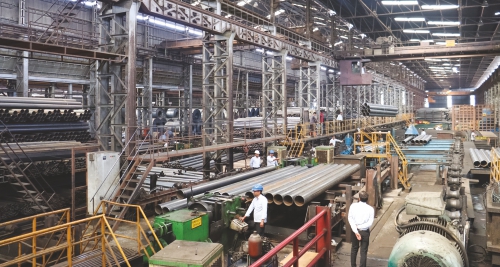
In terms of customer base, we have grown from catering to Northern India to supplying products all over India. We also supply to government’s programs. Last year, we contributed over 50,000 tonnes of pipes for Jal Jeevan Mission, in Rajasthan, UP, Himachal Pradesh, Jammu and Karnataka etc., and we expect to contribute similar capacities in the current year as well.
With increased capacity from Ballari plant and JSW Tube plant at Jharsuguda we have plans to export directly from 2023-24 both black and galvanized tubes.
TPI: What is your current product line and have you made any recent additions to it?
SJ: Our whole product line could be classified into three categories, based on sectoral applications. The black tubes are used for firefighting purposes, our pipes are among the top choices in the industry. Thereafter, we have GI tubes that are used for potable water-based applications which are again a preferred choice for quality conscious customers specially OEMs. Lastly, we have sectional tubing, which are used for structural applications in all types of infrastructure projects. Among the three, GI tubing applications are our strongest product and are well-recognized in the market. Customers, commercial or retail, specifically ask for our product due to immense trust in the quality. Other applications we cater to are tube well, rollers, fabrication, solar plants, poly houses etc.
Recently, that is about six months ago, we widened our product range to include powder coating tubes as well, which are used for door-to-door PNG transmission.
TPI: Do you see structural tubing as having a future in India?
SJ: Structural tubing already enjoys a huge demand and application in the residential, industrial, and commercial sectors of the US, Europe and other nations. It is a rejoicing moment for India, as the market demand for structural tubing is increasing in the domestic market as well. Although the residential market is still shy of the applications, the commercial market, such as high-rise buildings, malls, etc., is all set to embrace the scope of the applications. This demand is also getting fuelled by government policies and programs, such as Jal Jeevan Mission, and PM Har Ghar Jal Yojna. Infrastructural projects, such as railways, metro projects, airports, expressway corridors, etc., will also help in demand boost. The demand for high strength material tubing will increase and also the size range will keep moving towards higher side for structural application as the designs evolve.
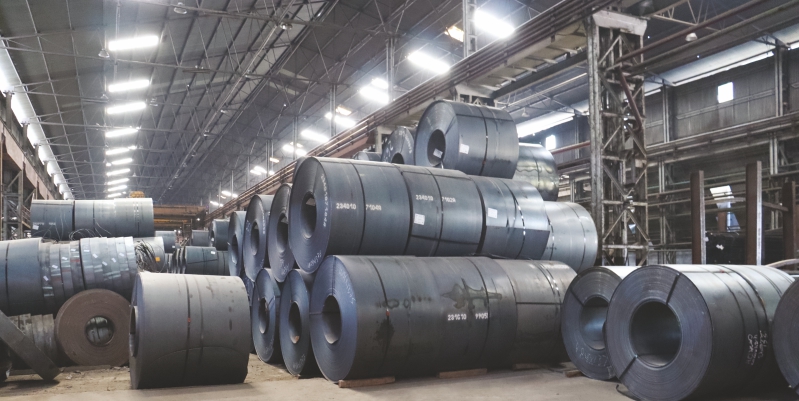
TPI: Can you share with us JIPL’s future plans?
SJ: JIPL has a greenfield tube plant project pipelined, whose construction shall start in April 2023. The plant will be set up in Ballari, Karnataka and shall serve our existing and expanding customer base in the Southern region of the Indian peninsula. The overall plant shall become operational in phases due to the sheer size of its operation, as we are aiming for a higher size range. Our targeted production capacity for Phase 1 is 250,000 TPA, which we will expand to 450,000 TPA in Phase 2. We also plan to set up a DFT mill for sections in Phase 2 after covering the round tube requirement of our existing customers in Phase 1 in Southern region.
In addition to the plant, we shall be putting up warehouses in Jharsuguda and Pune in coming year, here we already have our company’s sales offices.
JIPL is also venturing into the plastic tubes market, with the manufacturing of uPVC and CPVC tubes, albeit at a smaller scale and limited region in the year 2023-24.
We also recently signed an MoU with JSW Jharsuguda plant to manufacture MS tube. We are expecting to reach a volume of 100,000 tonnes in 2023-24. The speed has been very encouraging in last 3 months and helping us to capture markets in other regions.
We are looking for a manufacturing plant facility in Western region as well, which I feel we will conclude by Q1 2023-24.
TPI: What is the base idea behind setting up the Ballari plant?
SJ: In the tubes industry, transportation time and freight are major factors, for instance, long-distance freight charges are practically for transporting air, as the tubes are hollow structures. Hence, location is a huge factor and determinant in overall transportation and distribution costs. Our Hissar plant is already catering to Northern, North-Western, Central, and Gujarat regions, and we wanted to replicate these services in the Southern and Eastern regions as well, hence we planned a project to set up the Ballari plant. The other advantage is being close to the raw material where in JSW plant will be hardly 20-30 Km from this plant, which will also help us to save inward freight. We also plan to export from there as the plant will have latest technology and a very productive layout.
The Ballari plant is part of our strategic plan to widen our presence and better our services across India. In terms of product, the plant will target higher volumes, more precision, and better tolerances in the pipe diameters.
Also Read: Utkarsh India Aims at Fortifying Market Leadership for Plastic Pipes in Eastern India
TPI: How will you comment on the Indian tube industry?
SJ: The industry is inherently turbulent, for instance, in a span of mere two years steel prices (per Kg) fell from INR 76 to INR 50 and jumped again to INR 60. Although the prices have revived many market players who could not cope with the price pressure have to quit.
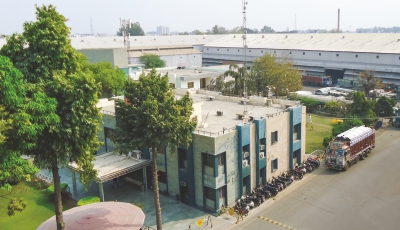
The demand continues to grow and new players continue to enter the market. I still feel there is enough for everyone as demand is also increasing and will continue to increase based on the fact that government policies and plans are towards modernization and improvement of human life across India.
The whole setup requires immense support and coordination among the suppliers, dealers, plant, and customers. JIPL feels blessed to have extremely supportive supplier partners, namely JSW Steel, SAIL and Tata.








